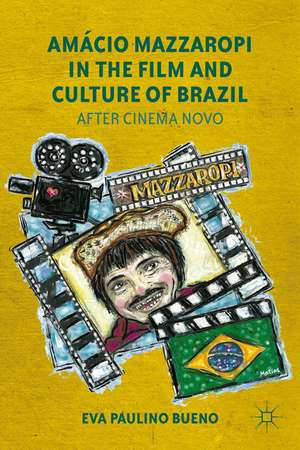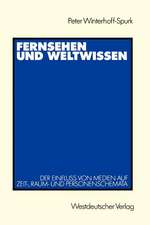Amácio Mazzaropi in the Film and Culture of Brazil: After Cinema Novo
Autor E. Buenoen Limba Engleză Hardback – 3 iul 2012
| Toate formatele și edițiile | Preț | Express |
|---|---|---|
| Paperback (1) | 381.21 lei 6-8 săpt. | |
| Palgrave Macmillan US – 3 iul 2012 | 381.21 lei 6-8 săpt. | |
| Hardback (1) | 385.84 lei 6-8 săpt. | |
| Palgrave Macmillan US – 3 iul 2012 | 385.84 lei 6-8 săpt. |
Preț: 385.84 lei
Nou
Puncte Express: 579
Preț estimativ în valută:
73.83€ • 77.29$ • 61.09£
73.83€ • 77.29$ • 61.09£
Carte tipărită la comandă
Livrare economică 05-19 aprilie
Preluare comenzi: 021 569.72.76
Specificații
ISBN-13: 9781137009180
ISBN-10: 1137009187
Pagini: 196
Ilustrații: XV, 196 p.
Dimensiuni: 140 x 216 x 15 mm
Greutate: 0.36 kg
Ediția:2012
Editura: Palgrave Macmillan US
Colecția Palgrave Macmillan
Locul publicării:New York, United States
ISBN-10: 1137009187
Pagini: 196
Ilustrații: XV, 196 p.
Dimensiuni: 140 x 216 x 15 mm
Greutate: 0.36 kg
Ediția:2012
Editura: Palgrave Macmillan US
Colecția Palgrave Macmillan
Locul publicării:New York, United States
Cuprins
Between a Cow and a Truck: Transformation in Mazzaropi's First Films The Divided Self: Defining Brazil in Race, Language, and Origin I Believe in Everything: Religion, Mysticism, God, the Devil, and a White Mare History, Resistance, Comedy On Accordions, Kisses, and Foot Odor: The Gendered and the Cosmic Body in Mazzaropi's Films
Recenzii
“Bueno’s writing style runs smoothly. Its languageis clear, accessible and devoid of academic jargon, even though this book canbe an excellent source for courses on the study of Latin America’s 20th centurycinema. Bueno has done a thorough and laudable investigation of Mazzaropi’slegacy within a vast spectrum of Brazil’s social landscape. … Amacio Mazzaropiin the Film and Culture of Brazil targets students and scholars devoted toBrazilian civilization, cinema at large, and gender studies.” (Dário Borim Jr.,Luso-Brazilian Review, Vol. 52 (2), December, 2015)
"Without diminishing the importance of the Cinema Novo movement, Bueno's study is very much committed to the proposition that of equal importance are alternative film projects in Brazil. She argues that there is a fundamental ideological problem involved in seeing Brazilian filmmaking of the 1940-65 period only in terms of what may or may not have attracted international attention. Hers is the first monograph-length study of Amácio Mazzaropi, his important films, and the social and cultural parameters they involve, parameters that provide an important index to popular culture in Brazil at the time, particularly as it relates to São Paulo and changing patterns of urban constituencies." - David William Foster, Regents' Professor of Spanish and Women and Gender Studies, University of Arizona
"This volume arrives at a prescient moment, when contemporary research on Brazilian cinema seeks novel approaches for a rapidly changing reality: that of a Latin American cultural and economic powerhouse at the outset of a new global order. Bueno's research on Mazzaropi makes a significant contribution to Latin American film studies by awarding long overdue attention to a modern-day master, filling a void in the national mapping of Brazilian identity." - Héctor Fernández L'Hoeste, professor of Latin American Culture, Georgia State University
"Without diminishing the importance of the Cinema Novo movement, Bueno's study is very much committed to the proposition that of equal importance are alternative film projects in Brazil. She argues that there is a fundamental ideological problem involved in seeing Brazilian filmmaking of the 1940-65 period only in terms of what may or may not have attracted international attention. Hers is the first monograph-length study of Amácio Mazzaropi, his important films, and the social and cultural parameters they involve, parameters that provide an important index to popular culture in Brazil at the time, particularly as it relates to São Paulo and changing patterns of urban constituencies." - David William Foster, Regents' Professor of Spanish and Women and Gender Studies, University of Arizona
"This volume arrives at a prescient moment, when contemporary research on Brazilian cinema seeks novel approaches for a rapidly changing reality: that of a Latin American cultural and economic powerhouse at the outset of a new global order. Bueno's research on Mazzaropi makes a significant contribution to Latin American film studies by awarding long overdue attention to a modern-day master, filling a void in the national mapping of Brazilian identity." - Héctor Fernández L'Hoeste, professor of Latin American Culture, Georgia State University
Notă biografică
Eva Bueno is an associate professor and chair in the Department of Languages at St. Mary's University.


